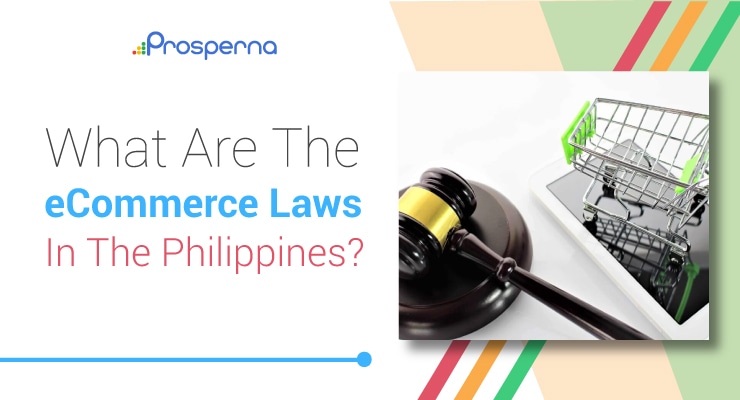Government aims to boost eCommerce laws in the Philippines.
Twenty years after the first eCommerce policy was passed, the community quarantines imposed to combat the COVID-19 pandemic accelerated the growth of online transactions and the adoption of technology.
But as a social seller or small business owner, you must be wondering…
“Are there eCommerce regulations I need to comply with and existing laws relating to online transactions that can protect me from potential dangers on the internet?”
In this article, you’ll discover the importance of eCommerce law for small businesses selling online. We’ll also briefly look at the laws and policies on online business and eCommerce website legal requirements for eCommerce compliance.
Let’s dive right in!
How Does the Law Define an Online Business or eCommerce?
The Republic Act 8792 or the Electronic Commerce Act of 2000 defines eCommerce as:
The process of buying and selling goods (and services) electronically by consumers and from company to company through computerized business transactions.
Otherwise known as everything we’ve been doing in the modern world and “New Normal.”
| The whole idea behind this law is to provide a secure legal framework and environment for eCommerce in the Philippines. |
It also allows the Department of Trade and Industry (DTI) to supervise the developments in the country and come up with policies and regulations, when needed, to facilitate the growth of eCommerce.
This brief description is just scratching the surface, but that pretty much summarizes this law.
The internet as a whole can’t be fully controlled and regulated. Government agencies, however, can manage internet users within the country’s jurisdiction. Thus the online business laws and regulations that we need to comply with.
What Kind of Certifications and Licenses Do Online Sellers Need to Operate Legally?
We’ve given you a complete guide on how to register your business with the BIR, but here’s a list of IDs, certificates, and licenses you should consider getting for your online business:
- BIR Certificate – to issue official receipts
- DTI Registration – for small businesses
- SEC Registration – for corporations
- CDA Registration – for cooperatives
- Mayor’s Permit – from your LGU or City Hall
- Barangay Clearance – from your Barangay Hall
- Professional IDs
- SSS – for individuals, employers, and small businesses
- DOLE – when hiring employees
- HDMF – for savings and government loans
- PhilHealth – health insurance
- Other Government Issued IDs (where applicable) – Driver’s License, Passport
- Certifications based on your business type
The Philippine government isn’t that strict towards online sellers who started a small business during community quarantine to recover from the financial and employment crisis. That said, complying with tax regulations is required by law.
| The government sees online business as legitimate as any other brick-and-mortar. And as businesses do, even online sellers are required to issue electronic receipts. |
What About Taxes? Are There Any Exemptions?
As illustrated by The Straits Times in an infographic, eCommerce taxes in the Philippines include:
- 12% Value-Added Tax (VAT) on online sales worth more than PHP 1.92 million a year.
- Transactions amounting to less than the threshold are taxed at 3% of the monthly revenue.
- Personal income and other taxes are applicable.
To quote from our previous blog,
“ALL businesses that make money online, selling products or services, are required to be registered with BIR. With that said, it’s important to also know that businesses with an annual income below PHP 250,000 are exempted from income tax.”
Apart from being a requirement and act of good citizenship, tax compliance comes with benefits, according to the Department of Finance:
| “Registered businesses are entitled to the Department of Trade and Industry’s low-interest loan program, and can also qualify for the government’s small business wage subsidy programs.” |
Which Online Business Laws and Regulations Protect My Online Business and Consumers?
Here are some eCommerce legislations that prioritize the welfare of businesses and consumers alike:
- Consumer Act – consumer protection on the internet
- Data Privacy Act – against administrative or civil infringements
- Online Content Regulation – restricting access to materials promoting indecent material online
- Cybercrime and Cybersecurity – stop hacking, cracking, or unauthorized access using a computer in order to corrupt, alter, steal or destroy electronic data
- Online Dispute Resolution & Domain-Name Regulation – when registering official domain names with business trademarks
| We’re not experts in giving legal advice, but your success and growth are in our best interests. You can always read up on related laws and policies on eCommerce and business regulations to learn more. And, of course, consult lawyers for legal matters. |
Are There Internet Policies I Need to Consider Apart From Philippine Laws?
Some of these policies might not apply in the Philippines. But since people worldwide are using the internet, your online business is not limited to Filipinos only. It is in your best interest to take precautions.
To get started, have these legal requirements for eCommerce websites ready:
- Shipping and Delivery Policy – when customers can expect products and how packages are delivered
- Payment & Return/Refund Policy – payment processing, including transaction fees, and handling return or refund requests for products or services
- Terms and Conditions – protect the merchant in the selling process
- Data Protection – handle all data in compliance with the law
- Privacy Policy – ensure the protection of personally identifiable information, including electronic signatures
- Online Advertising Compliance – safeguard consumers and prevent deceptive and unfair acts or practices
| The terms and conditions will outline the terms of delivery, shipping, refunds and payments, exclusions of liability, and terms of use for your website. Make sure that these are updated! |
These can help protect you and your customers from fraud, especially for small businesses that may be prone to refunds and chargebacks from fraudulent buyers.
How are Violators Sanctioned and Prosecuted?
Last but not least, it is vital to know the legal issues associated with online scammers in the Philippines as eCommerce becomes the norm.
While there are online business laws in place to penalize and punish criminal offenses, the internet needs stricter regulations in the Philippines to protect honest businesses and trusting consumers from:
- data privacy and security breach
- product liability
- issues on third-party information
- consumer identity theft
- copyright infringement
- online and email-related defamation (libel or slander)
- domain theft and cybersquatting
According to the eCommerce Law – Republic Act No. 8792, the same penalties in regular laws apply to eCommerce and online transactions as well.
| Online fraud and scammers are punished with a minimum fine of one hundred thousand pesos (PHP 100,000) and mandatory imprisonment of six (6) months to three (3) years. Other eCommerce violations have a maximum penalty of one million pesos (PHP 1,000,000) or six (6) years of imprisonment. |
Keep Your eCommerce Business Safe and Protected
Without a doubt, eCommerce has significantly changed the landscape of how we do business for the better. As much as there are gains, there are also a lot of risks that come with transacting online, especially with data privacy and security.
Knowing the laws and regulations for eCommerce is just the beginning. Your next step is doing your due diligence to comply and uphold these measures.
When your eCommerce business and customers are protected by the law, you foster confidence and trust in your customers to conduct business with you.
Further reading:
- What Is a Business Plan and Why Is It Important?
- How to Impress Potential Investors & Get Funding
- Register Your Online Business in BIR and DTI
- Apply for an SSS Business Loan in the Philippines
Start Your eCommerce Business with Prosperna
Prosperna, an all-in-one eCommerce for Philippine Businesses, can help you set up an eCommerce website Philippines or have a social commerce platform.
Our mission is to empower 100,000 MSMEs in the Philippines with simple and affordable eCommerce software so you can get started on your journey to the Cyber Marketplace in the fastest possible time, without breaking the bank.
In fact, we are super passionate about helping Philippine MSMEs we’re giving you a free account FOREVER!
Want to start selling online? Create your free-forever Prosperna account now.




